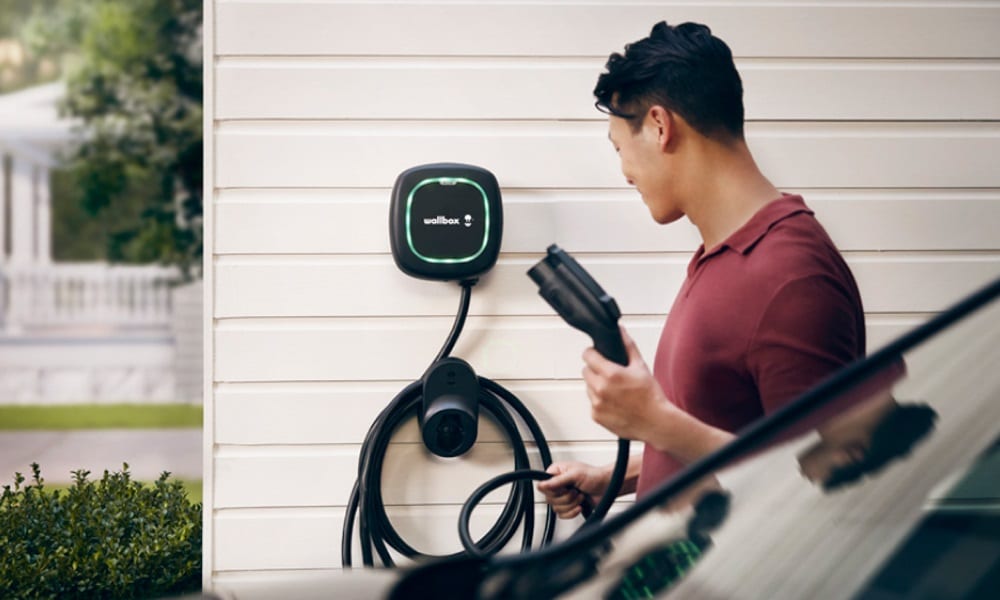
The patented technology used in our solar panels ensures maximised efficiency – even in low light – which means greater savings for our clients year round.

Research shows consumers are 100 times more likely to return a standard panel over a SunPower Panel, a testament to their quality.

The most comprehensive warranties available on the Australian market, with a full 40 Year Warranty and no hidden fine print.
Brands
Meet Your Energy Demands Swiftly with Wallbox EV Chargers
Introducing Wallbox EV Chargers, the ultimate solution for powering your electric vehicle in Adelaide. With cutting-edge technology and unrivalled reliability, these chargers provide fast and efficient charging right at your fingertips.
With a 2 year warranty, Wallbox chargers are designed to convert AC power from the electrical grid into the appropriate DC voltage required by electric vehicles, enabling the charging of vehicle batteries. With Wallbox on your side, it’s never been easier to enjoy the convenience of smart charging capabilities, allowing you to monitor and control your charger from your smartphone.
Are you ready to power up with confidence? Get in touch with a member of the Energy Buster team to learn more about our solar services and EV solutions.
Learn more about our innovative energy solutions:

What Are the Best Types of Wallbox EV Chargers?
Wallbox Pulsar Plus
This compact and efficient charger offers up to 40 amps of power, enabling fast charging for your electric vehicle. It features smart connectivity, allowing you to control and monitor the charging process through a mobile app.
Wallbox Copper SB
Designed for residential charging, the Copper SB offers a stylish and robust solution. It provides up to 32 amps of power and supports both single-phase and three-phase installations, making it versatile for different electrical setups.
Wallbox Commander 2
Ideal for commercial and public charging, the Commander 2 offers high-power capabilities with up to 22 kW charging speeds. It comes with advanced features like dynamic load management and access control for efficient and secure charging in shared spaces.
How Much Do Wallbox EV Chargers Cost?
The cost of a Wallbox EV charger can vary depending on the specific model, features, installation requirements, and any additional accessories or services you may opt for. Generally, prices for Wallbox chargers range from $1,500 to $5,000+ .
Additionally, it’s worth exploring any potential government incentives, grants, or rebates that may be available to support the adoption of electric vehicle charging infrastructure, as these can help offset the cost of purchasing and installing a Wallbox charger.
For more information or a custom quote, reach out and speak to a member of the Energy Buster team today!
Wallbox EV Charger Benefits
✔ Fast and Efficient Charging: Wallbox chargers provide fast charging speeds, allowing you to power up your electric vehicle quickly and efficiently. This helps minimise downtime and ensures you have sufficient range for your daily needs.
✔ Versatile and Flexible Installation: Wallbox offers a range of charger models suitable for various installation settings, whether it’s for residential homes, workplaces, or public locations. They can be easily integrated into existing electrical systems, providing flexibility and convenience.
✔ Smart Connectivity: Wallbox chargers often come with smart connectivity features, allowing you to monitor and control the charging process remotely through a mobile app. You can schedule charging sessions, track energy usage, and receive notifications, enhancing convenience and control.
✔ Safety and Protection: Wallbox chargers incorporate advanced safety features such as overcurrent protection, ground fault detection, and surge protection. These measures ensure safe and reliable charging operations, protecting both your vehicle and the electrical system.
✔ Future-Proof Technology: Wallbox chargers are designed with future developments in mind. They often support software updates, allowing you to benefit from new features and improvements as they become available, ensuring your charging infrastructure remains up to date.
✔ Environmental Sustainability: Using Wallbox EV chargers promotes sustainable transportation by reducing reliance on fossil fuels. By charging your electric vehicle with clean energy, you contribute to lower emissions and a greener future.
Wallbox EV Charger Installation Process
The installation process for Wallbox EV chargers typically involve the following steps:
Step One: Assessing Electrical Capacity
A qualified electrician will evaluate your electrical system’s capacity to determine if it can support the charging station. They will consider factors such as your electrical panel’s size, available circuits, and overall electrical load.
Step Two: Selecting the Charger Location
You and the electrician will decide on the optimal location for installing the Wallbox charger. Factors such as proximity to the electrical panel, accessibility, and parking convenience will be taken into account.
Step Three: Upgrading Electrical Infrastructure (if necessary)
In some cases, your electrical system may require upgrades to support the charging station’s power requirements. This can involve adding a dedicated circuit, increasing the electrical panel’s capacity, or upgrading wiring.
Step Four: Mounting the Charger
The Wallbox charger will be securely mounted on the selected location, typically on a wall or pedestal. The electrician will ensure proper alignment and stability.
Step Five: Electrical Connections
The electrician will make the necessary electrical connections, including wiring the charger to the electrical panel, installing any required circuit breakers, and connecting the charger to the power source.
Step Six: Testing and Commissioning
Once the installation is complete, the electrician will conduct tests to ensure the charger is functioning correctly. This includes checking electrical connections, verifying voltage levels, and testing the charger’s communication with the mobile app or control interface.
Step Seven: Obtaining Certification and Approval
The electrician may need to obtain any required permits or certifications to comply with local regulations and ensure the installation meets safety standards.
If you think that purchasing EV chargers is the right thing for you, then the next step is to decide on the best brand. Get in touch with us by either calling us on (08) 7120 6377 or by filling out our fast free quote form.























































